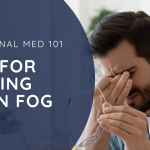It's no secret that gut health is vital for overall physical health, but in recent years the gut-brain connection, the idea that gut function can impact mood, has been the subject of extensive study. It turns out depression might not just be a byproduct of our thoughts, but it could also be an effect of what's going on in our gut. This blog post will cover gut health basics to help you understand how your digestive system impacts your brain and vice versa.
The enteric nervous system, often described as the "second brain," acts as an information highway between your brain and your gut. Located in the walls of our digestive system, this “second brain” is responsible for producing the hormones and neurotransmitters that regulate many of our everyday functions- everything from hunger to mood and anxiety. This hidden organ may be a key player when considering how diet can affect daily life or even mental health disorders such as anxiety and depression. Further evidence that your mama had it right when she told you to "go with your gut" or gave you a peppermint to tame the "butterflies in your stomach" when you were nervous.
The idea of having two brains isn’t anything new. For years doctors considered this folklore, but recent advances in science have demonstrated that the tissue of the digestive system contains around 100 million neurons- more than either the spinal cord or the peripheral nervous system. Doctors as far back as Hippocrates have speculated that the gut had a prominent role in the overall physical and mental well-being of human beings. For example, in the late 19th century, doctors believed that an overgrowth of intestinal microbes caused depression. Still, without a complete understanding of gut flora and its function, they could not create treatments for mental illness that were safe or effective.
We now know that the microflora in our intestinal tract performs various bodily functions and are responsible for expressing the genetic information that builds molecules that let us digest food, fight infection, and feel emotions. It is the bacteria in your gut that is responsible for producing approximately 90% of the body's serotonin and over half of the Gamma-Aminobutyric Acid (GABA), the neurotransmitter that regulates the nervous system and switches off stress reactions.
The gut-brain axis is connected chemically through hormones and neurotransmitters and physically through the vagus nerve. This nerve sends messages to the heart, lungs, and other vital organs and conducts messages to and from the brain and gut. And while scientists have always acknowledged the vagus nerve's role in transmitting messages, recent studies have revealed the shocking information that approximately 90% of the fibers in the vagus nerve actually transmit information TO the brain, not the other way around. Which led scientists to begin digging into research in the area of neuro-gastroenterology in the hope that this budding field could lead to fundamental changes in how we treat depression and anxiety.
Depression is the leading cause of disability worldwide, and nearly one in ten Americans is taking a psychiatric drug to treat a mood disorder. And while psychiatric meds like SSRIs and SNRIs can treat the symptoms of depression and anxiety, they aren't effective at treating the root cause of the illness. Given the current research in the area of gut-brain connection, it raises the question- have we been treating the wrong brain all along?
All of the antidepressants currently on the market are designed to alter neurotransmitter activity in the brain. Serotonin is the key hormone that stabilizes our mood, feelings of well-being, and happiness. Gut bacteria produce 90% of the body’s serotonin. Tryptophan- the precursor for serotonin- is tightly regulated by gut bacteria. So we can safely assume that body's ability to absorb nutrients that are key to mental health is controlled by gut bacteria. The logical next step is to take a look at options that might aid the "second brain" in helping the one in your noggin.
Fostering Healthy Gut Flora
Diet and Supplements
Diet is one way to increase and nourish a healthy and diverse microflora in your gut. Prebiotic foods are high in fiber and work best when they are raw. Try asparagus, bananas (especially if they aren’t quite ripe), garlic, onions, or jicama. Probiotic foods like yogurt (the label should say live or active cultures) and unpasteurized, fermented foods like sauerkraut and kimchi are also great ways to nourish your gut flora.
Probiotic supplements can help make your gut happy, but navigating the options to find an effective supplement can be difficult. Everyone's "perfect flora" is different, so it may take some trial and error to find the right option. The supplement you choose should be stored in your fridge or other cool, dry place, and the label should state that the bacteria are live and there are billions of colony-forming units CFU(s) in the supplement.
Controlling Stress
The connection between the brain and gut goes both ways. Research has found, for example, that tweaking the balance between beneficial and disease-causing bacteria in an animal's gut can alter its brain chemistry, leading it to become more bold or anxious. On the other hand, the brain can also exert a powerful influence on gut bacteria; as many studies have shown, even mild stress could tip the microbial balance in an animals’ gut, making them susceptible to infection and other molecular reactions.
Mindfulness and stress management will help balance the feedback loop and keep everything flowing smoothly.
It’s easy to think of each body system as a separate entity, but the truth is they are connected and can influence one another. The gut and brain are prime examples of how changes in one affect the other. And while treating depression and anxiety are complex issues, it is important to consider the whole body when trying to effectively eliminate disease. If you are suffering with depression and anxiety and have struggled to find relief from medication, making these simple changes to your diet and lifestyle may help increase your chances of success.
*If you are currently prescribed an antidepressant, please consult your medical team before making any changes.




Recent Comments